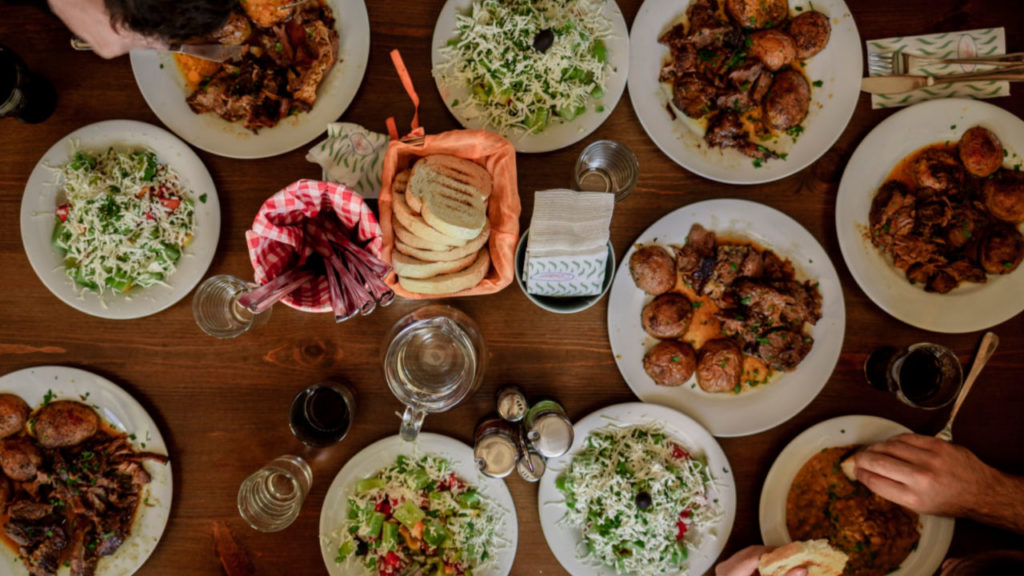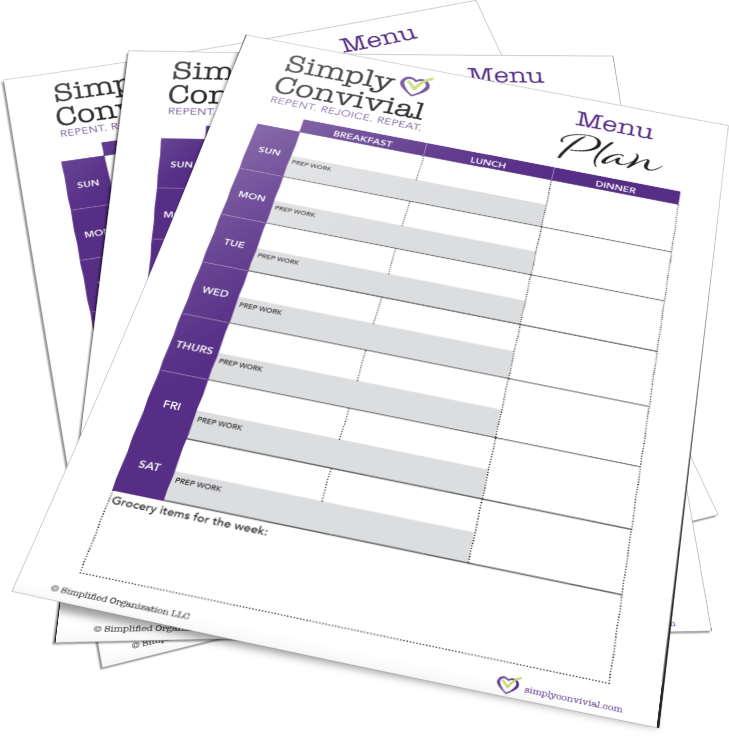Getting dinner on the table faster and with less effort – that’s the dream, right? We want easy family dinners because dinner is something we need to do every day, one way or another.
When it feels like we spend half the day dealing with food, it’s easy to think we must be doing something wrong, that there must be some other way.
Or, perhaps we aren’t spending half the day making food. Relying on convenience food or restaurants to do the food prep for us might be biting into our health, our energy levels, or our budgets – and we know we need to suck it up and get better at this whole food thing.
The truth is that food really is a huge part of our work as homemaker. In our role as builders-up of people, job number one is feeding them.
Yes, there are ways we can simplify and streamline, but meals will always be at the heart of how we serve the people in our homes.
So let’s look at three ways we can have easier family meals:
- Take less time grocery shopping by using a master list & taking inventory before shopping.
- Use a menu plan template for faster dinner-time decisions.
- Practice the basic processes of cooking so they become second nature.
Keep reading, because I’ll go in depth on each one of these steps to make family dinners easier and faster.

In our search for “easy,” we also don’t want to forget the “family” part of the equation. When we’re unhappy in our work, a few kitchen tips will not actually help.
We need to know and appreciate the real depth and significance behind the work. -Feeding people is our job as homemakers- (link). When we feed bellies, we are feeding more than physical bodies, we are feeding a psychological need for care, provision, love.
When we put a meal on the table and eat it together, we are setting the stage and carving out the time for conversation, connection, relationship-building.
Perhaps if we realize all that is really happening in the act of feeding our people, we will not resent the time we give to shopping for, preparing, serving, and cleaning up after those meals.
No tips or trick for kitchen management or menu planning will solve a bad attitude about cooking. True, some people have a natural love and talent for it. That does not mean that those who are not naturally talented can give up on it.
One person may cook out of love and delight. Another may do it out of duty and obligation. The reality is that there is a fundamental duty to feed our families, and it is a duty we can learn to enjoy by practice, even if cooking is not our favorite creative outlet. Enjoyment comes from growth in skill, which comes by deliberate practice. We can learn to enjoy cooking more by embracing the duty of it and determining to improve.
Here’s a plan for that deliberate practice.
Easy family dinners happen when we have a system and a go-to solution for regularly bringing food home, making decisions about what to make, and improving our skills in the basic processes of cooking.

Easy family dinners start with groceries.
Before we can prepare dinner or put it on the table, the food has to come into our house.
How we manage the grocery shopping sets the possibilities for how we can manage family dinners.
Use a master pantry list.
You don’t need to reinvent the wheel every time. You don’t need to come up with a detailed meal plan before making a grocery list, and you don’t need to guess about what goes on your list.
Taking the time to figure out what you regularly use and making a master grocery list based off that knowledge will save you hours every month. Not only will you save time making your grocery list, you’ll also save time in the grocery store, because you’ll have a regular route and routine to get what you need. Browsing, thinking, and planning while staring at shelves will be a thing of the past.
Grocery shop by whim sometimes, but not always.
Sure, sometimes we find something at the grocery store that strikes our fancy. We buy it, and then later base a meal off of it. That kind of flexibility and creativity helps us enjoy cooking more.
But we don’t always have the bandwidth for that kind of creativity every night or every trip to the store. We also need a stockpile of family favorites that are not only quick to prepare, but also use ingredients we always have on hand (because we shop with a master pantry list).
Learn more: How to Grocery Shop the Smart Way.
Keep your groceries accessible & visible.
If you forget about what you have on hand, you’ll end up buying more than you need. Before making your grocery list, shop your own pantry – including your fridge and freezer.
The more readily visible and accessible your pantry items – and more clearly labeled if in the freezer – the easier, simpler, and faster it will be to use them.
You don’t need an elaborate inventory system. You just need to keep what you have easy to see. Then you need to look there and base your meal planning off what you find.
Easy family dinners require minimal planning.
To make things easier, we need to cut down our planning time. Sure, a plan helps you save time, generally. However, it’s also easy to spend more time planning than doing, a sort of productive procrastination.
But we can get dinner on the table faster and with less effort by following simple planning patterns that require merely filling in the basic blanks.

Download the free menu planning templates – including a master pantry list – that will help you get every meal on the table with less fuss.
Easy family dinners don’t need recipes.
Trying to keep recipes organized or find the one you want when you need it slows down the daily rhythm of regular meals. It’s not really necessary for your basic family weeknight dinner.
You can practice and cook pasta and rice and potatoes without a recipe. Add a raw or roasted vegetable with a drizzle of olive oil and a sprinkle of salt.
Stick meat in the crockpot or Instapot, braising and pan-frying and baking also are basic enough procedures that once you get the hang of it, you don’t need to follow a recipe.
Basic cooking skills are simple to learn.
Of course, none of us start out simply knowing how to do these basic cooking procedures, but if we pay attention and practice deliberately, with the intent to learn the feel of them, we’ll go a long way in a short time.
Such basic skills are not only simple to learn if we set our mind to it, they are also satisfying to learn. We don’t have to be tied to an instruction book. We can learn to cook by feel and taste with a little reading of the good cookbooks and a lot of practice.
Since dinner happens every single day, there’s plenty of opportunity to get a lot of practice in quickly!
Recipes – and planning for them – slow you down.
If four or five o’clock sneaks up on you, you don’t have time to spend 30 minutes tracking down the right recipe. Rather than spend time organizing and planning elaborately enough that your recipe is at hand, why not simply plan meals you’ve learned by heart?
The attraction of the neat and cute organization systems is really in the aesthetic appeal, not the actual time-savings they give. Most elaborate, cute, systematic organizing plans give you the payoff of a creative project that makes you feel good about yourself, without the payoff you were actually looking for in the first place: less resistance to getting a good dinner on the table for your family.
These aesthetic-focused systems often take more time to create and keep up than they save you when it comes time to actually do your work, making them a net loss on time and energy rather than a gain.
Instead of spending time organizing, spend time gaining practical skill. Then you will reap the benefit you wanted. You will finally find it easy to cook family dinners most weeknights.
Make dinner easy by simplifying how you cook.
Often we make dinner – especially weeknight family dinners – more complicated than they need to be. And if they’re not complicated, then they’re likely convenience – because we don’t want to deal with the complicated ideal we have in our heads.
If we reduce the complication, we can also reduce our reliance on convenience foods. Simplifying is key not only to cooking without recipes, but also to speedier cooking and happier meal times.
A one-pot meal is generally a starch, a protein, a vegetable, and some sort of binding. In the case of spaghetti, it’s pasta and beef with tomato sauce as both the vegetable and the binding. You can start with sauted onions, you can add the classic herbs, you can take or leave the garlic or the olives – and you can use all of the above or none of the above to fit your family’s taste.
That is the real freedom of learning the skill of basic cooking and simplifying your meal expectations. Build a meal out of a starch, meat, and vegetable, and you have endless variety and yet simple options. Rice, chicken, and mixed vegetables can be cooked and served separately, combined with a dash of soy sauce for stir-fry, or mixed together with a cream sauce for a chicken rice bake.
For the next month, observe the dinners you prepare as you prepare them and see the basic parts. As you discover the patterns, cooking will be more interesting and satisfying – as well as faster. You’ll know what you can skip and what you can add to fit your own particular family’s taste – rather than think that your family’s taste ought to fit the recipe author’s taste.
The more your own personality and your family’s preferences are expressed in your cooking, the more you will stop wasting time dreading and procrastinating the daily necessity – which is the biggest time and energy waster of all.
Easy family dinners are important.
Family dinners are worth investing our minds, hands, and hearts to. People who are provided food feel love in tangible and deep ways. Getting dinner on the table is not simply a chore someone has to do. It is the role of a homemaker – a person who makes a home.
It is over meals that the best conversations and connections happen. The cooking is a setting for the real work of a family: relationships.
They are worth the work.

Download the free menu planning templates – including a master pantry list – that will help you get every meal on the table with less fuss.
Up next: How to be a better homemaker.
